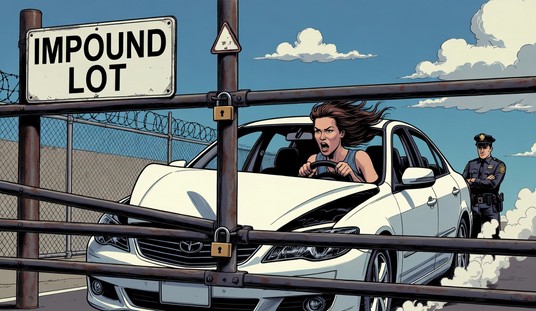Do you remember the moment when you first thought of yourself as a conservative? What drew you to it?
I came to conservatism after being led astray. My first inking of ideological awareness came in the eighth grade. My social studies teacher lectured on the two-party system, describing the differences between the choices as follows (paraphrased from memory):
Democrats are the party of the common man, the worker, the poor, those struggling to get by.
Republicans are the party of the rich, the powerful, and those who like things the way they are.
Naturally, in light of that explanation, I instantly regarded myself as a Democrat. My family wasn’t rich. We weren’t particularly powerful. While I hardly felt oppressed, there were certainly things that I imagined could be better.
It wasn’t until high school that I was exposed to another perspective. It came in the form of Rush Limbaugh, who at the time hosted a television show alongside his daily radio program.
My interest in Limbaugh was the same kind of titillating curiosity which drives teenagers toward all things forbidden. I knew him through his media-fostered reputation. He was, according to the mainstream institutional voices, a bigoted blight on the political discourse, a less than human threat to social decency. That was something I simply had to see.
The truth proved as provocative as advertised, but not in the way my eighth-grade social studies teacher would have approved of. While Limbaugh proved bombastic and self-aggrandizing, his content was benign and downright inspiring. I found myself nodding in agreement as he made a case for equal rights under the law and responsibility both fiscal and personal. He said things which I had always believed at some level, but had never spent much time thinking about. I realized, much to my surprise and amusement, that I was a conservative.
Those were the last days of the Clinton administration, which had been in place since I attended grade school. Clinton was all I knew, as far as presidents were concerned. My entire political awareness had developed in the context of a liberal establishment. During those years, I listened as talk radio hosts and Republican politicians cast a vision of life under their hypothetical reign. They would cut the deficit. They would pay off the debt. They would repeal regulations, abolish entire federal departments, reform or eliminate entitlements, and otherwise shrink government while expanding liberty. It sounded great! I was all for it. Indeed, it was hard to imagine how anyone could possibly oppose such objectively wise proposals.
Alas, Republicans actually took over. George W. Bush was elected and, in the wake of 9/11, obtained legislative majorities in both houses of Congress. This was it! This was the moment. The vision cast by Limbaugh for years prior would finally come to fruition. Nothing could stop it … except for Republicans.
Stop it they did. Instead of spending less, they spent more. Instead of paying off the debt, they grew it. Instead of rolling back regulation and abolishing departments, they gave us Medicare Part D and Homeland Security. For a young conservative like myself, it was shocking, disappointing, and infuriating. From that anger, perhaps more than the election of Barrack Obama, the Tea Party was born.
During the Obama years, history repeated itself. Once again, a generation rose in the shadow of a liberal establishment. Once again, commentators on the right—more numerous than ever—cast a vision of what could be if Republicans were elected. The difference, of course, was that many of us remembered when these promises were made before. We also remembered how they went unfulfilled. That no doubt fueled the unconventional candidacy of Donald Trump.
Certainly, the Trump fans I have encountered over the past two years have cited his imagined ability to “shake things up” or “drain the swamp” as an overriding justification for standing by him through every controversy. With his earth-shattering victory over Hillary Clinton, he will soon get the chance to validate that faith.
As a prolific “never Trump” writer right up to the day of the election, I join the likes of Ben Shapiro in admitting that I was wrong about Trump’s electoral prospects. Like Shapiro, I sincerely hope that Trump continues to prove me wrong by governing as a conservative. For that to happen, Republicans will need to hold him accountable. Unfortunately, judging by the bevy of chest-thumping, “never Trump” bashing, and victory lapping which has proliferated conservative media as of late, holding the president-elect accountable doesn’t seem to be something which many are interested in. That’s alarming, because cheerleading a Republican administration for nothing more than being Republican was among the reasons we saw lackluster results from George W. Bush.
A litmus test for how we handle our monitoring of the Trump administration has presented itself in the form of Steve Bannon. The former head of Breitbart News served as Trump’s campaign CEO, and has recently been named as the incoming administration’s chief strategist and senior advisor. Bannon’s association with Trump has attracted charges of racism, antisemitism, and worse from critics across the political spectrum. In response, many have come to Bannon’s defense—including notable colleagues here at PJ Media—praising Bannon and dismissing any criticism as wholly contrived nonsense.
David Goldman put it this way:
The charges against Steve Bannon are a tissue of lies without a modicum of merit.
That’s an awfully definitive statement. Not a modicum of merit? Let’s explore that.
Bannon has been called a white nationalist and a Nazi among other things. While these charges seem outrageous on their face, and the left certainly cries wolf regarding bigotry as a matter of course, it would be a mistake to grant Bannon a clean bill of moral health without close examination.
The problem with Steve Bannon is not his personal views, for which there seems to be little evidence of anything egregious. The problem with Steve Bannon is the role he has played in proliferating the abhorrent views of others. While in charge of Breitbart News, Bannon transformed it into a haven for the alt-right. While Bannon may not be racist, antisemitic, or white nationalist himself, the alt-right plainly is. It’s their defining characteristic, and they’ll be the first ones to tell you so.
The man who coined the term “alt-right” is Richard Spencer. He holds a distinction as the movement’s most prominent thought leader. As president of the National Policy Institute, an alt-right think tank, Spencer spoke at a celebration in Washington D.C. over the weekend attended by his fellow white nationalists. From Politico:
Steve Bannon… described [Breitbart News] over the summer as “the platform for the alt-right.” Spencer largely agreed with that assessment, but he also insisted he didn’t see either Trump or Bannon as members of the movement themselves, though they have given him “hope.”
“I would say Steve Bannon’s comment that [Breitbart is] a platform of the alt-right is probably something I could agree with, say 90 percent, just in the sense that it’s clearly moved away from the conservative movement,” Spencer said. “It was pro-Trump, it was also a site that tons of people on the alt-right [go] to get their news from, they share [it]. I don’t think Breitbart is really ideologically alt-right, no, but it’s interesting and very hopeful for me that Bannon is at least open to these things.”
Whatever else Spencer may be, he is honest in his assessment of both Trump and Bannon. Neither man appears to personally adhere to the alt-right. But both have proven willing to entertain it. That should deeply disturb us all.
As the son of a black father and a white mother, I was dissuaded from liberal brainwashing by the conservatism articulated by Limbaugh. He presented values which affirmed my worth as an individual, independent of identity politics, and offered hope for a future lived in freedom.
As that same son of a black father and a white mother, my existence proves offensive to the alt-right. According to them, I have no worth whatsoever. Neither do my children. My family undermines the national identity. It’s an idea diametrically opposed to conservatism as Limbaugh once articulated it. Indeed, Spencer will be the first to tell you that the alt-right (being “alternative” and all) stands opposed to conservatism. It’s like matter and anti-matter. The two ideologies cannot occupy the same space.
So when a guy like Bannon, who has intentionally pandered to and enabled this anti-conservatism, rises to a level of prominence in an incoming Republican administration, it stands as a point of rational concern. If we are conservatives, and if that distinction has any meaning beyond jeering Democrats and cheering Republicans, then we need to take that concern seriously. If we do not, we risk more than our moral and intellectual credibility. We risk the soul of conservatism itself.
Trump should go out of his way to condemn the alt-right. He should make clear that their objectively racist, white nationalist views have no place in his administration or in the Republican Party. That declaration should be echoed by a repentant Bannon, or Bannon should be fired. It must be abundantly clear that American greatness is defined by our founding principles and not ethnic identity.
That shouldn’t be hard. It shouldn’t be controversial. I shouldn’t have to write this. It should go without saying. If professed conservatives actually care about conservatism, they shouldn’t have to be convinced to preserve it, and they sure as hell shouldn’t be aligning with or defending its moral and intellectual opposite.









Join the conversation as a VIP Member